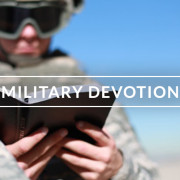Help of the hopeless – October 20, 2019
“Do not let Hezekiah mislead you when he says, ‘The LORD will deliver us.’ Has the god of any nation ever delivered his land from the hand of the king of Assyria? Where are the gods of Hamath and Arpad? Where are the gods of Sepharvaim? Have they rescued Samaria from my hand? Who of all the gods of these countries has been able to save his land from me? How then can the LORD deliver Jerusalem from my hand?”
Isaiah 36:18-20
Devotion based on Isaiah 36:18-20
See series: Military Devotions
Sometimes it seems there is no hope because it seems there is no help.
It might be a violent storm. It might be a vicious disease. Or, as it once was for Israel, it could be an overpowering enemy. Whatever form it may take, desperate situations call for desperate help.
It is then terrifying to realize the help may not be there.
The list of seemingly unstoppable armies that appear on the pages of history is a long one. Napoleon led one of those. So did a fellow by the name of Hannibal, with his elephants. Likewise a Rommel, with his tanks. But the name that struck terror into the hearts of Israelites at the time of King Hezekiah was an Assyrian named Sennacherib.
A later poet described his style of waging war with the words, “The Assyrian came down like a wolf on a fold.” They came down from modern Syria and overran everything. Destruction, pain, and death followed. “Unstoppable” was the word that seemed to fit best.
When they came to the edge of Jerusalem, Sennacherib sent a field commander to demand that the city surrender. He pointed out the situation was hopeless because the Israelites were helpless—just like many cities before them.
It was not an empty boast. City after city had already fallen before this superpower. Jerusalem knew this. The ten northern tribes of Israel had been overpowered, with many casualties. Survivors had been rounded up and marched into captivity. So thorough was the defeat that those ten tribes vanished without a trace. They became the famous lost tribes of Israel.
Only Judah and little Benjamin were left.
Sennacherib knew the Israelites well enough to realize they would not be counting on an ally to deliver them, nor would they boast of the strength of their army. Israel’s final answer would be, “Our help is in the name of the Lord!” It was a matter of faith in their God.
So, he attacked their God.
Karl Marx, the father of Communism, once famously remarked, “Religion is the opium of the people.” He meant it offered people a false sense of security and well-being. Sadly, it can be true.
The religions of the people of Arpad and Hamath offered empty promises. Their destruction was the proof. Would it not be the same for those who placed their hope in the Lord?
Hezekiah did not believe that. History does not reveal that. Instead, we learn: “Then the angel of the LORD went out and put to death a hundred and eighty-five thousand men in the Assyrian camp. When the people got up the next morning—there were all the dead bodies! So Sennacherib king of Assyria broke camp and withdrew” (Isaiah 37:36).
The situation of Israel was not hopeless because she was not helpless. She sang out, “Our help is in the name of the Lord.” And it was.
So is ours.
Prayer: Eternal Father, strong to save, one of our greatest enemies is doubt. Although we know about you and your promises, we sometimes find ourselves not trusting you. Our eyes look for proof, and our hearts long for evidence. Grab hold of our faith so that it might stand up to attack and overcome unbelief. Without you, we are both helpless and hopeless. Remind us of who you are and what you have done. Point us to Jesus, the help of the hopeless. Amen.
Written and recorded by Rev. Paul Horn, WELS National Civilian Chaplain to the Military, San Diego, California.
All Scripture quotations, unless otherwise indicated, are taken from the Holy Bible, New International Version®, NIV®. Copyright ©1973, 1978, 1984, 2011 by Biblica, Inc.™ Used by permission of Zondervan. All rights reserved worldwide. Note: Scripture reading footnotes are clickable only in the web version.


